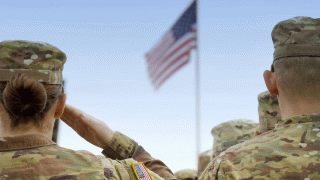
Robert Bannon is no stranger to adversity. The former U.S Army veteran served in four combat tours, including Desert Storm and Operation Iraqi Freedom. But when he retired as a lieutenant colonel after 21 years of active military duty, he struggled to reinvent himself in civilian life.
A former commander of a 500-soldier aviation battalion, this natural born leader was used to strategizing, problem-solving and mentoring teams. Finding a career that could utilize his skills was tough. So he transitioned by working for the government as a test pilot while coaching golf in his spare time.
His son was his first pupil, and he coached him until he was one of the top players in his home state of Virginia, which helped him get a college scholarship to Saint Leo University in Tampa. “That was my transition point,” recalls Bannon. “That’s when I decided to move to Florida and start my own golf business.”
The veteran launched his business out of his new home in Jacksonville, and word soon got out among his son’s college golf teammates that he was a great coach. At the same time, the 54-year-old used his VA benefits from the GI Bill to go back to school to get a degree in golf management.
Today he runs TPG Golf Performance and Golf Academy, located on the grounds of the Cimarrone Golf Club in St. John’s, Florida. The facility opened last month and already instructs 35 juniors, retirees, collegiate players and professional golfers. It also offers golf club fitting and club repair. Bannon expects revenues will hit $100,000 this year as he grows his business.
Bannon’s story exemplifies the challenges military vets face in the workforce and how they often choose entrepreneurship as a career later in life. Currently, more than 2.5 million U.S. businesses are owned by veterans, making up about 9% of all businesses in America, according to the Small Business Administration.
U.S. & World
“Veterans typically start their companies as a third career at an average age of 44,” according to Misty Stutsman, director of Entrepreneurship and Small Business at the Institute for Veterans and Military Families at Syracuse University. “Our research shows that first they come out of the service and use their benefits to go to school and then get recruited by corporate America. After getting a strong business background, many decide to start their own businesses.”
It can be tough trying to find a job in the corporate arena at that age, experts say. That can be a motivating factor for choosing entrepreneurship.
The types of businesses they launch runs the gamut, but many gravitate toward finance and insurance, transportation, home services, construction, mining, oil and gas, manufacturing, science and technology, travel and real estate.
Another big industry they are attracted to is franchising. “That’s because franchising offers a business model they feel comfortable with,” explains Eric Stites, CEO of the Franchise Business Review. “It’s a proven brand with a rule book and systems in place. Military folks tend to be good at following operational procedures.”
He notes that in the Franchise Business Review’s most recent satisfaction survey of nearly 29,000 franchise owners, 85% enjoy being part of their franchise organization. Their average annual income after two years: $94,244.
Two-thirds indicated that the long-term growth opportunity for their business is either “strong” or “very strong.”
Paying it forward
It’s not surprising that 1 in 7 franchises are owned by veterans, generating more than $41 billion, the International Franchise Association reports. Some famous franchises were founded by military veterans, including real estate giant RE/MAX, co-founded by Air Force veteran Dave Liniger. Another is JDog Junk Removal & Hauling, a company founded by a U.S. Army veteran with 200 active franchises in 28 states.
In addition to being well-suited to entrepreneurship, many franchise companies – such as Dream Vacations, Dunkin Donuts, Neighborly. Sports Clips and the UPS Store – offer financial incentives, training and mentoring through the IFA’s VetFran program to help veterans jumpstart their business. These include: discounts on the application and franchise fees, waiving royalties for serveral months and providing training and other incentives. Today 550 franchise companies participate in the program.
“We find that franchising fills a gap for veterans who want a home for their entrepreneurial skills,” says Radim Dragomaca, director of VetFran. “It’s not surprising that they often outperform non-veteran franchise owners since they have tenacity and they are unfazed by long 80-hour work weeks needed to launch a business.”
But they face three unique challenges, Stutsman points out. “One is getting access to capital, especially since they don’t have a long track record to build a credit history, since they have not been part of civilian life for much of their career. The others are social networking and getting mentoring help.”
Female veterans have it even harder. For them raising capital is especially difficult despite the fact that many have good technical skills, according to a study by the Institute for Veterans and Military Families at Syracuse University.
Resources for military veterans
Recognizing these obstacles, champions have emerged to provide the resources veterans need to launch start-ups. They recognize that some 200,000 military veterans will be returning stateside annually over the next five years. according to the Department of Defense.
VetFran, launched in 1991, was one of the first programs aimed at ’vetrepreneurship” and to date. Others include:
Boots to Business, an entrepreneurial education and training program run by the SBA that provides lessons on fundamentals, like developing a business plan and fund-raising.
Veteran Business Outreach Centers work in partnership with the SBA and provides business training, pre-business plan workshops, counseling, mentoring and resource partner referrals.
Bunker Labs is a nonprofit national network of veteran and military spouse entrepreneurs dedicated to helping veterans start and grow businesses that provides incubator space, networking and CEO mentoring services.
Hivers and Strivers, an angel investment group, focuses on early-state investments ranging from $250,000 to $1 million to support start-ups founded and run by graduates of the U.S. military academies. Most of the investors have served in the military and are senior executives with broad experience.
Veteran LLC is a multistate network of community development financial institutions that provides access to loans and revolving lines of credit for veterans and veteran family members that want to start a business. It was formed as an initiative of JPMorgan Chase’s Small Business Forward program to support inclusive economic growth.
These resources really help veterans jumpstart their businesses. David Kapojos, 46, owner of FirstLight Home Care franchises in West Los Angeles and Pascadena, California, can attest to that. A former biological weapons specialist stationed in the Middle East, he started a civilian career when he returned stateside in 2010. But he quit two years ago to start his own business.
“I opted for a franchise because of my lack of experience. I did research and found out many franchisors such as FirstLight offer discount and support for military veterans. The company gave me a $14,000 discount off the franchise fee ,and that was a big deal for me.They waived the royalty, tech and advertising fees for three months. They gave me a 50% discount on my accounting software and educational support for my caregivers. ”
Today Kapojos franchisees serve 43 clients with 62 part-time active caregivers.
“In the military you face obstacles, but you never quit. You remain persistant and keep trying until you eventually succeed. That’s the same thing in business.”
This story first appeared on CNBC.com
SIGN UP: Money 101 is an 8-week learning course to financial freedom, delivered weekly to your inbox.
CHECK OUT: 7 spring side hustles that could help you earn up to $50 an hour — or even more viaGrow with Acorns+CNBC.
Disclosure: NBCUniversal and Comcast Ventures are investors in Acorns.



